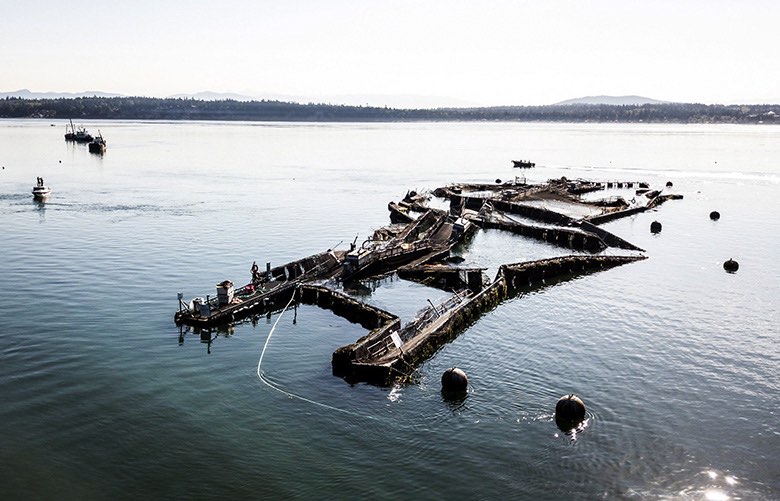forum
library
tutorial
contact

Atlantic Salmon Swim Far and Wide
After Fish Farm Collapse
by John Ryan
KUOW, October 23, 2017
|
the film forum library tutorial contact |

|
Atlantic Salmon Swim Far and Wide
by John Ryan
|
 Atlantic salmon have spread far and wide in Pacific Northwest waters since 160,000 of them escaped from a collapsed fish farm near Anacortes in August. The fishy fugitives have swum 130 miles south past Tacoma, 250 miles northwest past Tofino (most of the way up Vancouver Island) and up a half-dozen rivers around the region, according to the Washington Department of Fish and Wildlife.
Atlantic salmon have spread far and wide in Pacific Northwest waters since 160,000 of them escaped from a collapsed fish farm near Anacortes in August. The fishy fugitives have swum 130 miles south past Tacoma, 250 miles northwest past Tofino (most of the way up Vancouver Island) and up a half-dozen rivers around the region, according to the Washington Department of Fish and Wildlife.
The escapees' wide spread, despite efforts by tribes and others to reel them in, has raised fears they could harm the Northwest's wild Pacific salmon.
Lummi, Samish and other tribal fishers caught 55,000 Atlantic salmon in the weeks following the collapse of Cooke Aquaculture's salmon farm off Cypress Island. Now that the jailbreak fish have dispersed so widely, tribal boats are no longer actively chasing them, according to Tony Meyer with the Northwest Indian Fisheries Commission.
Some of the unwelcome Atlantics have moved beyond salt water and entered fresh water, as salmon do when they are ready to reproduce. Escaped Atlantic salmon have been caught swimming up the Nooksack, Puyallup, Samish, Skykomish and Snohomish rivers and British Columbia's Harrison River.
On that tributary of Canada's biggest producer of wild salmon, the Fraser River, a local fisherman caught an Atlantic salmon -- believed to be a Washington state escapee. (There's also a chance it escaped from one of British Columbia's dozens of salmon farms.) Apparently, after swimming across the international border, it turned right near Vancouver and muscled its way 65 miles upstream from the Pacific.
Avid angler Don Temple didn't know what it was when he pulled it into his boat, maybe a wild coho, judging by the fight it put up.
"It didn't come into my mind that it was an Atlantic until we Googled it," he told the Vancouver Sun.
Temple said he served up his catch for his family's Canadian Thanksgiving dinner.
Presumably that male fish had been looking for a place to spawn and start a family of his own, just like a pair of Atlantic salmon caught on the Puyallup River, 17 miles upstream from the salt water of Tacoma's Commencement Bay.
These Atlantic interlopers could compete with local fish for food or spread parasites or disease picked up in the cramped net-pens they were raised in. So far, there's little evidence that the invaders have offered much competition: the farm-raised fish seem not to have figured out how to hunt in the wild.
"A few fish had things like wood chips or mussel shells in their stomachs, but the vast majority had empty stomachs," Michele Dunlop with the Washington Department of Fish and Wildlife said in an email.
It's also possible some of the fugitives could spawn and reproduce, but many scientists say it's unlikely.
Throughout the 20th century, governments in the Northwest states and British Columbia intentionally introduced Atlantic salmon here. They dumped millions of fish eggs and young Atlantic fish into Pacific rivers, to "provide additional and unique fishing opportunities," in the words of the Washington Department of Fish and Wildlife.
Attempts to introduce the fish to British Columbia began in 1905, when rail cars carried moss-filled crates of salmon eggs from Newfoundland and Scotland across the continent.
Over the next three decades, more than 8 million Atlantic salmon were added to the province's waters.
Atlantic salmon were still being deliberately released into Washington waters as recently as 1991, when state officials poured 6,000 fish into Pass Lake in Deception Pass State Park.
Fortunately for the region's wild salmon, all the efforts to bring Atlantic competition into Pacific salmon streams were utter failures.
More recently, Atlantic salmon have escaped fish farms in Washington by the thousands, apparently without gaining a finhold in the wild:
Scientists have never reported Atlantic salmon spawning successfully in Washington waters.
The Washington Department of Natural Resources is investigating what caused this summer's great escape, with findings expected by the end of December.
About 100,000 of the finned fugitives remain unaccounted for.
learn more on topics covered in the film
see the video
read the script
learn the songs
discussion forum
